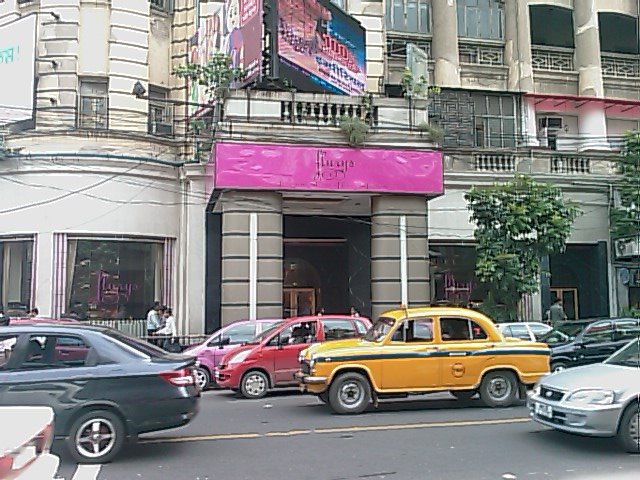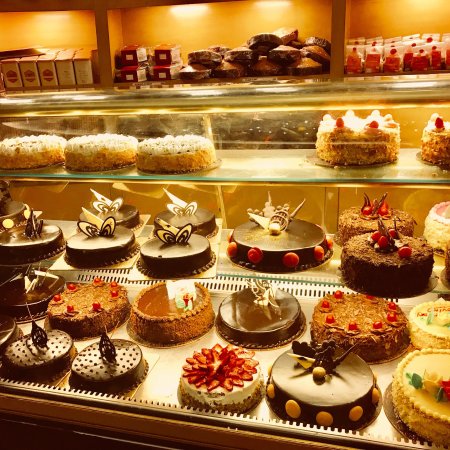FLURYS

“Calcutta is very emotional about Flurys,” says Sudip Dey, one of the oldest serving managers of the elegant tearoom, between sips of freshly-brewed tea served in delicate ivory cups. He adds, “When we renovated in 2004, we opened just before Christmas. There was a queue that stretched 500 metres on both sides of the front door to get in... every year on Christmas, it's the kind of queue you still see.”
Started in 1927 by Swiss couple Joseph and Frieda Flury, the space began as a tea room and confectionery shop. Although the country's political capital shifted to Delhi in 1911, Calcutta was still the second city of the empire, and Park Street was its glamorous heart, with live music venues, smoky bars and a rollicking night life.
Flurys was where the British ate Sunday breakfast. And where wealthy Bengali, Jewish, Armenian and Parsi families would congregate over cups of tea and slices of apricot-glazed Sachertorte.

Humble origins According to Bachi Karkaria's book The Cake That Walked, the tearoom changed hands one morning in 1965 when Joseph Flury was waiting to cross the road and bumped into Jit Paul (co-founder of Apeejay Surrendra Group) who asked him if he wanted to sell. The couple had run Flurys for almost 40 years by then and were thinking about moving back to Switzerland. They met soon after and the deal was settled in half an hour.
In 2004, 77 years after it began, Priya Paul (chairperson, hospitality division of Apeejay Surrendra Group) put together a team to give the by-then-shabby genteel Flurys a makeover. London-based Conran and Partners were hired to create a fresh identity, along with Mumbai architect Prakash Mankar.
Today's candy box interiors, shimmering chandeliers and raspberry-pink packaging are the result. And while plenty of old Calcuttans grumble about the changes made to their childhood haunt, they're mollified by the fact that much of the menu remains the same. “We are very clear. Heritage products: we do not touch. People are crazy about them,” says Chef Vikas Kumar, adding that loyalists notice even the slightest tweak.
His cabin, set in the centre of Flurys' sprawling bakery, which is just across the road from the tearoom, is redolent with the scent of chocolate, vanilla and freshly-baked bread. His table is piled with notes, recipes and blocks of butter. “We use French butter,” he states, handing some to a passing chef. “This justifies our price.”
Menu matters He reels out a list of their top-selling products: “Cube pastries are very popular, especially strawberry and pineapple. The baba pastry, our old-school sandwiches made with lots of butter... and rum balls of course.” He adds with a grin, “Many people credit us with being the creators of the rum ball — and I never deny it.”
The tearoom now has about 20 outlets in Kolkata, including a snazzy one at the airport which does brisk business — 1,200 transactions every day. But it is the flagship on Park Street that still draws locals and tourists alike, lining up for the ‘full English', featuring bacon, ham, sausages and fried eggs.
About 75% of the menu is made up of heritage products, though they do attempt to keep things fresh by introducing items like single-origin chocolates and nolen gur cheesecake. But no matter how imaginative the new confectionery is, nothing does as well as their old-fashioned milk bread, which has customers who have been buying it for four decades.
“There is a row of Land Rovers, Audis and Mercs outside the bakery every single day, with chauffeurs holding prepaid cards to buy milk bread,” says Chef Kumar. He adds, “It has a declared shelf life of one day. And Flurys has never sold day-old bread. Each loaf is hand mounded. There are no chemicals, no enhancers.”
Watching a baker cut cake into cubes, before slathering on pink icing, Chef Kumar says, “All our products are handmade. Every pastry, every patty. This is how our customers want it.”
Christmas cakes, which are on sale all year, are especially popular in December. While they normally sell about 750 to 1000 lb across their outlets per month, in December this year, they expect it to shoot up to about 50,000 lb.
Waiter Charles Johnathan Ovid, who has worked here since 1983, hands over two pink cube cakes to an elderly customer, then leans against the counter and wistfully lists items from the older menus: “Brazilian pudding, lemon soufflés, diplomat pudding...” Although he retired recently, he says he comes back to help with service, “Because this is my first home.” Looking fondly at the customers, he adds, “See those kids over there — I knew their dads and moms when they were kids.”
* * * *
PS: I had their full continental breakfast which had everything including coffee or tea in 2019. It was Rs 900 before tips. The price was higher that what I pay in Canada.